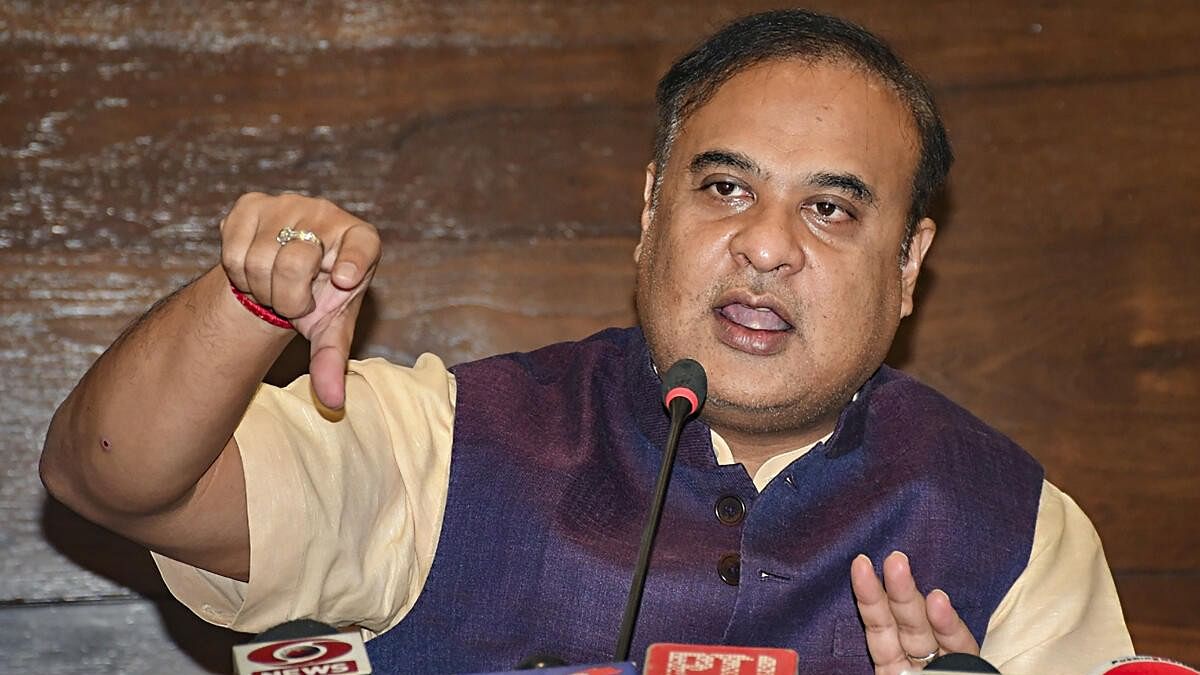
Assam CM Himanta Biswa Sarma.
Credit: PTI Photo
Guwahati: The BJP-led Assam government on Friday decided to repeal the "colonial-era" Registration of Muslim Marriages and Divorces Act, 1935 in order to push UCC, a move which led the Opposition parties call it "an anti-Muslim and arbitrary."
After the Cabinet cleared the proposal for repealing the Assam Muslim Marriages and Divorces Registration Act, 1935, CM Himanta Biswa Sarma said on Friday night that the move marks a significant step towards prohibiting child marriage. Sarma said the act contained provisions allowing marriage registration even if the bride and groom had not reached the legal ages of 18 and 21, respectively, as required by law.
The Sarma-led disposition, which took charge in May 2021, arrested nearly 4,000 persons as it launched a drive to end child marriage in the state. More than half of them belong to immigrant Muslims (Bengali-speaking Muslims). Sarma said the drive was taken up to check high rates of maternal and infant mortality rates, which was more among the Muslims.
Briefing the reporters about the Cabinet decisions, Minister Jayanta Mallbaruah, however, said the repeal of the "colonial era" act was a significant step towards CM Sarma's efforts to introduce Uniform Civil Code (UCC). "We want all marriages to be registered under the Special Marriage Act. From now, the district commissioners and district registrars will be authorised to take custody of registration records currently in the custody of 94 Muslim Marriage Registrars on repeal of the legislation under overall supervision, guidance and control of the Inspector General of Registration," he said.
The Cabinet also decided to provide financial assistance of Rs. 2 lakh to each of the 94 Muslim marriage registrars for the rehabilitation.
After Uttarakhand government passed a bill for UCC recently, Sarma said his government was working on a "robust act" to end polygymy and bring in UCC in Assam.
A note of the cabinet meeting said the present act has a lot of scope for non-registration of marriage as registration of marriages and divorces is not mandatory under the Act and the machinery of registration is informal.
Anti-Muslim move:
Reacting to the decision, Badruddin Ajmal-led AIUDF and Congress on Saturday called the same "an anti-Muslim and arbitrary" decision by the BJP-led government to push its communal agenda ahead of Lok Sabha elections and reap political mileage in the elections. "We are not surprised. Beacuse the BJP is taking many anti-Muslim decisions, from interfering in the ajaan to closing the Madrassas and stopping the scholarships for the Muslim students. They will take many such decisions as the Lok Sabha eletions approach," Ajmal told reporters.
BJP has set a target to win at least 11 out of the 14 Lok Sabha seats in Assam. In 2019 polls, BJP had won in nine, Congress bagged three while Ajmal won in Dhubri.
Nearly 34 per cent of Assam's population (3.12 crores) are Muslims. BJP targets the Bengali-speaking immigrant Muslims, calling them illegal migrants and projecting them as a threat to the indigenous communities.
Aman Wadud, a lawyer in Gauhati High Court and a member of Congress told DH that the government could have amended the provision in the act that allowed registration of underage marriage (with the consent of the parents), instead of repealing the entire act. "As the government says that Muslim marriages would also be registered under special marriage act, this may instead push non-registration of marriages. As a lot of documents are requried for registration of marriages under the Special Marriage Act, the less educated and economically weaker Muslims may skip the registration," he said. "The move is politically motivated. Why is the governemnt repealing the act ahead of the elections?" he asked.
Land rights: The cabinet also decided to include the Ahom, Koch Rajbongshi and Gorkha communities in the list of protected classes of persons in Balipara tribal belt who have been occupying the land prior to 2011, in order to protect land rights of the indigenous communities. "This will protect land rights of indigenous communities like the Ahoms, Koch Rajbongshis and Gorkhas who are bona fide Indian citizens," said the statement.
In a push to promote tribal languages in line with the National Education Policy, 2020, the state cabinet also decided to introduce Mising, Rabha, Karbi, Tiwa, Deori and Dimasa languages as medium of instructions in foundational stage of school education and subsequently shift to a regional language as medium of instruction.